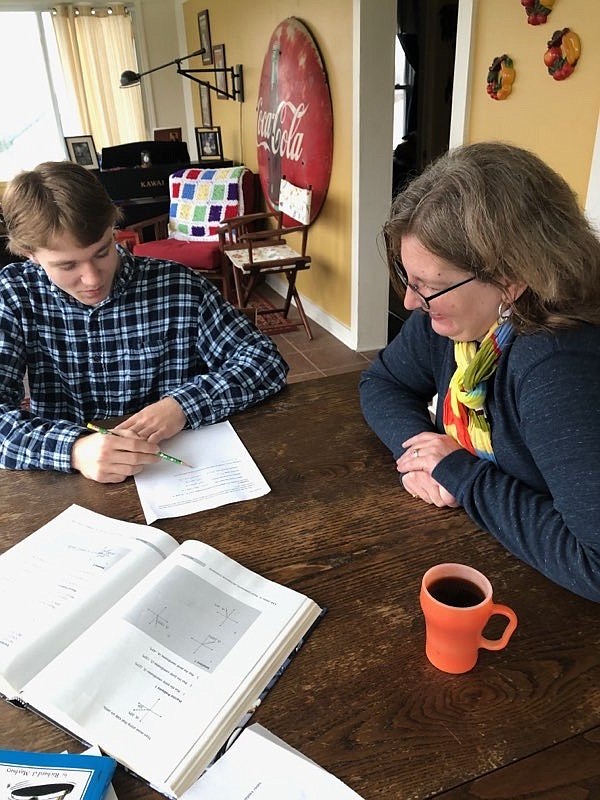With schools closing and more people working from home due to the coronavirus pandemic, you may find yourself with a second job - teacher.
The News Tribune gathered advice on how to keep your child engaged and survive this stressful time.
Consider this a survival guide for your new situation.
We've got your six.
1. Relax.
Slow down and breathe. There are many changes to adjust to, so you need to take everything one step at a time. This is a stressful time for everybody, so you can give yourself some grace. You need to be calm to be able to teach your child, said Katie Epema, Parents as Teachers coordinator in the Jefferson City School District. If you are stressed, your child will be stressed.
Gina Prosch, the vice president of the Jefferson City Home Educators Board of Directors, who organizes homeschool co-op classes, said one thing she has learned is you don't have to do everything or have the answer to every single problem in one day.
Emily Roberts, a kindergarten teacher at Belair Elementary School, said it is important to relax and do fun activities together as a family.
"I feel like we're all working hard to make sure that our kids are still learning, but people need to relax and recharge and take some time to just not work," Roberts said.
Children will have a lot of questions and insecurity right now, Prosch said. Be honest with your child about why you are both staying at home by explaining the pandemic to them. If they continue to ask, answer again then redirect them to a different subject. It's important they know why their routine has changed, but they don't need to spend the entire day focusing on it, she said.
If you do get angry, don't lie to your child about it. Be honest with your child about your emotions, Prosch said, because if you are angry, they will see it on your face. Tell them you are upset and that you need a minute away from them to cool off.
2. Create a new routine.
Set up a "new normal" routine; children and adults benefit from having a schedule. Break up the day to include fun activities involving music, art, exercise and playing outside. Schedule time to also read books, do chores and do school work.
Rhonda Allen, a behavior interventionist at Thorpe Gordon Elementary School, who was a teacher for 15 years, said breaking up the day is important. At school, she said, they are not sitting in a desk doing worksheets all day.
Older children can help plan the schedule by giving their input on what they want to do. For younger children, it is easier for them to understand a routine if you put it in pictures, Epema said. Children need to feel safe and secure in order to learn, so creating a routine will help them know what to expect.
Make sure you make time for yourself each day, too. Have your children do something by themselves while you take a break.
"Make sure that you are taking care of yourself as well as taking care of your kids," Roberts said. "At school, I get a plan time for a reason - so that I can take a break from the kids and prep for what I need to do and just take a moment to breathe."
3. Incorporate teaching into everyday tasks.
Learning doesn't have to include reading and worksheets. Tasks such as cooking, laundry, watering the plants and yard work can all be a learning opportunity. While teaching your children how to cook, you can also incorporate a math lesson into it when measuring ingredients.
"This is a great opportunity for teaching kids things they need to know in order to be successful adults," Prosch said.
You can also find many learning opportunities by engaging with the world around you, such as putting a bird feeder in your backyard and counting the birds that come to it, or looking at the flowers in the yard, Prosch said.
4. Make learning fun.
Incorporate learning with art, music or something physical. Work on basic facts with things around the house, such as adding and subtracting or multiplication. You can also do a lot with a simple deck of cards, such as playing "war," Allen said. If you want to make it more complex, they could flip over two cards at a time and then add, subtract or multiply the numbers, and the person with either the highest number or lowest gets all four cards.
5. Connect with your child.
This is a chance to spend more time with your child, get to know them better, and build a stronger relationship with them. It is important for parents and children to build time in the day to play together, Epema said, because children need to feel connected to the person from whom they're learning. Prosch said education is important, but building relationships with your children is even more important.
6. Remember you're not alone.
Everybody is at a loss right now, even teachers and parents who homeschool their children. Teaching at home is different from teaching in a classroom, and even children who are homeschooled typically go places that are now closed. Prosch said parents who homeschool their children every day don't even have all the answers, but everybody is capable of doing it. You just have to learn some new skills along the way.
Roberts said teachers in the Jefferson City School District are prepared to answer any questions students and parents may have, whether it's a question on a homework assignment or just advice on how to navigate this situation, so she encourages them to reach out.
.

